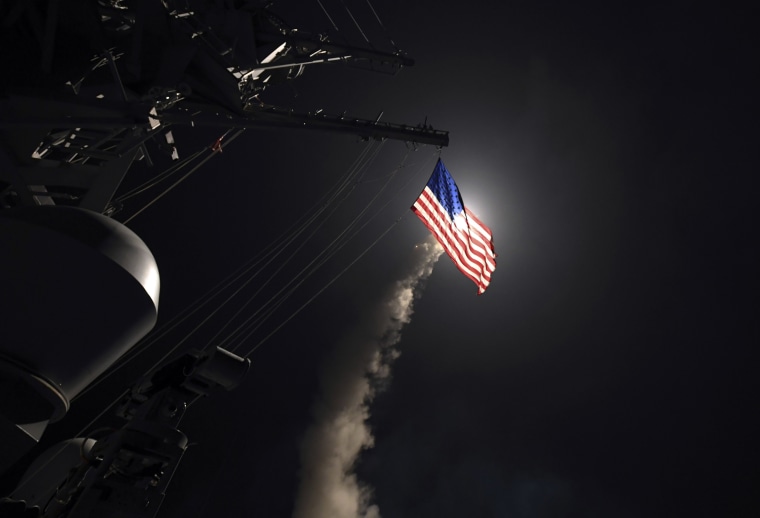Legal experts differ on whether Thursday's cruise missile strike on a Syrian airfield violated U.S. or international law.
But they largely agree that even if it did, there won't be any practical legal consequences.
"I don't know how they will justify this one," a former senior national security adviser told NBC News, "but even if it's illegal, there isn't much that can be done about it."
President Trump suggested two justifications Thursday night.
"It is in this vital national security interest of the United States to prevent and deter the spread and use of deadly chemical weapons," he said. And he added that by using chemical weapons, Syria "violated its obligations under the Chemical Weapons Convention."
Harold Koh of Yale Law School, who was a State Department legal adviser in the Obama administration, suggested Friday that the attack may be legally justified as a humanitarian act. The test, Koh said, is whether a humanitarian crisis disrupts the international order, "including proliferation of chemical weapons, massive refugee outflows, and events destabilizing to regional peace and security."
Koh and other experts on international law also say the limited nature of the missile attack tilts in its legal favor. They note that the law sometimes does not punish acts after the fact that were not explicitly authorized beforehand.
But Michael Glennon of the Fletcher School of Law and Diplomacy says on the "Just Security" blog that the attack violated the United Nations Charter, "given that there's no plausible case to be made for self-defense or Security Council approval."
Any time a president authorizes the use of military force without seeking approval from Congress, it raises the issue of the War Powers resolution, passed by Congress in 1973. It says the president "in every instance shall consult with Congress before introducing United States Armed Forces into hostilities."
But every president since the resolution was adopted has suggested it violates the separation of powers, given the president's commander-in-chief powers in the Constitution. And the U.S. Supreme Court has never definitively ruled on its application.
"It is a remarkable fact about the U.S. Constitution that, 228 years after its creation, we still don't know what limits, if any, it imposes on unilateral presidential uses of military force," said Jack Goldsmith a professor at Harvard Law School and a former Defense and Justice Department lawyer.
While some in Congress have said President Trump should have sought approval or at least consulted with congressional leaders, the military action has received broad bipartisan support.
"The real test," says NBC News analyst Juan Zarate, a former National Security Council staff member, "is whether it is considered legitimate by the international community. I think it will be seen as legitimate and overdue."

